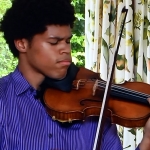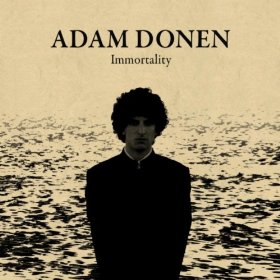Adam Donen ‘Immortality’
Adam Donen grew up in Cape Town, South Africa, the eldest child of prominent anti-apartheid activists. He delivered his first poetry performance at age six, reciting works by William Blake and Samuel Taylor Coleridge to ANC freedom fighters inside Polsmoor Maximum Security Prison. Much as everyone who heard the Sex Pistols’ Manchester Free Trade Hall gig is said to have started a band, so everyone who heard Adam would later become a cabinet minister: audience members included Tony and Lumka Yengeni and Jennifer Schreiner. Adam began playing guitar a year later.
He moved to London at eighteen, read English and started a band. His first major project, garage artrockers Alexandria Quartet, toured the UK for much of 2006 and 2007, playing six shows a week in grotty ketamine dives. Their music was violent and political, and they channeled Old Testament-style hellfire at apathetic Blair babies. After sixteen months of raging, burn-out set in. A spell of depression and agoraphobia left Adam in an underground hovel in Hackney, disinclined to leave the house or take visitors. There he set to work on new poems and songs. He developed an obsession with the 60s band Love; upon discovering that they based their string arrangements on Rimsky-Korsakov’s Principles of Orchestration, he duly devoured the textbook.
Around this time, a mutual friend brought Adam to the attention of producer Robert Harder (whose other credits include Herbie Hancock, Brian Eno and Pete Doherty). This led to 2008’s album and poetry book ‘As Our Parents Slowly Turn to Clay’, recorded in Harder’s 2-Noise Studios. Virtuouso jazz sax player Pete Wareham (of Acoustic Ladyland and Mercury Prize winners Polar Bear) guested on many of the tracks. Jo Silverston (Rachel Unthank, Emily Barker) provided cello.
By 2009, after the dissolution of a long-term relationship with his violinist, he decided that he had tired of rock music. He took time out to study the Old Poets with whom he had spent his youth, and worked his way through the Lomax field recordings. Gradually, he set about composing a new album. It was to be called Immortality, and was to be, he wrote, ‘the mausoleum of my childhood’. The songs were quiet dirges set against the backdrop of a declining civilisation. In August, Donen returned to Harder’s studio to lay down the tracks, joined by a string quartet, flautist, horn section and an array of guest backing vocalists. Mixing was finished by October.
On playing the opening track, ‘Immortality’, I was struck by superb production quality that characterises the album. Clarity and separation are superb and provide the opening guitar and string passages with a three-dimensional quality. Donen’s vocal has a youthful, detached quality and with poetry such an important feature of his makeup, lyrics are crystal clear. So, sound quality is excellent but I had some difficulty in understanding the meaning of lyrics. For example, “You carved out my name on a steel cigarette case/I carved out my head on an old double bed/What truths and what hopes and what memories bled/Through the charge sheets that long passed for songs.” At a guess ‘Immortality’ is about the past and not altogether happy memories. That said, there’s much to like about this strong album introduction, which ticks most of the boxes, including a double-tick in the melody one. ‘Fragment (I Had A Deam)’ is all the above but at a glacial pace and with lyrics that are short, simple and comprehensible (”I had a dream/I bought her drinks/I kissed her in the pub/We called it love/We took some pills to get ourselves to sleep”).
‘It’s Over Now’ verges on the epic as it unfurls a relentless vitrolic tirade on conflict and the making of sham heroes. ‘A Century Of Stone’ is an altogether more contemplative, gentle affair with one of the strongest melodies on the abum, and some of the most beautiful string passages.
This is essentially poetry attired in the most sumptious music, firmly in the contemporary folk style (’Stumble On’ and ”Lullaby For Kaiya’ are supreme examples of this), with sound of the highest quality. It’s also a distinctive album that demands listening attention, and deserves to be heard.
4/5
|
|

|

Depeche Mode |
LATEST GALLERY IMAGES

Where Israel Goes, Misery Follows 
The Kanneh-Masons |
|
|


